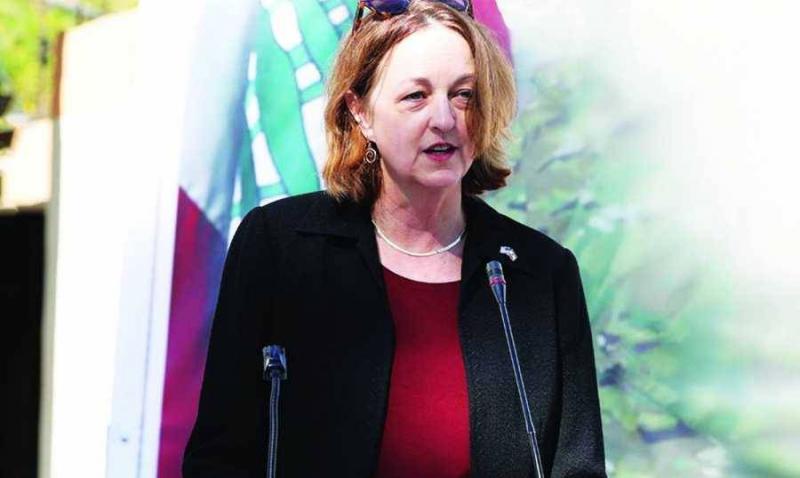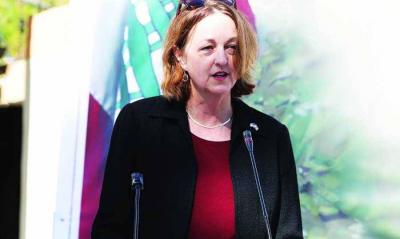The threat issued by Israeli Defense Minister Yoav Galant to expand the geographic scope of military confrontation with Hezbollah and target it beyond Lebanese borders has caused concern among the United States and European Union countries. This has compelled them to advise Lebanon not to squander the opportunity to restore calm in the south by gradually implementing Resolution 1701. This is what U.S. mediator Amos Hochstein aims for, aiming to prevent the escalation of the war, which could lead Lebanon into a new phase challenging to manage in terms of internal repercussions.
Sources from prominent parliamentary figures informed "Asharq Al-Awsat" that the postponement of the Five-Nation Committee ambassadors' movement until after the holiday break did not prevent U.S. Ambassador to Lebanon Lisa Johnson from intensifying her meetings on two fronts: the first focuses on urging lawmakers to break the deadlock in electing a president, while the second revolves around the need to create political conditions to prevent the war from expanding to include Lebanon by implementing Resolution 1701 gradually. This is what the U.S. mediator is working towards.
In this context, Ambassador Johnson met with members of the Change Forces Bloc, including MPs Michel Doueihy, Mark Daou, and Waddah Sadek, and subsequently hosted a dinner for them, along with other opposition MPs, including Fouad Makhzoumi, Ghassan Hasbani, Elias Hankach, and Fadi Almokh, the head of the parliamentary Foreign Affairs Committee, affiliated with the Development and Liberation Bloc led by Speaker Nabih Berri.
The American ambassador's initiative comes as a parliamentary delegation representing the opposition prepares to travel to Washington soon, including Michel Moawad, George Okeis, as well as Daou, Sadek, and Hankach, who are expected to meet U.S. officials at the State Department and the White House, along with the American team handling the Lebanese file.
Although the U.S. ambassador did not elaborate in detail on Hochstein's assigned task to implement Resolution 1701, she merely stated, according to parliamentary sources, that he is working between Lebanon and Israel to find common political ground to ensure its gradual implementation, with an increase in the number and equipment of the Lebanese army, which will receive full support at all levels, alongside UNIFIL forces to restore calm to the Lebanese-Israeli borders.
Johnson noted, as per the same sources, that Hochstein is negotiating with President Berri to create conducive conditions for implementing Resolution 1701. A prominent parliamentary source revealed to "Asharq Al-Awsat" that he awaits the return of the U.S. mediator, which depends on efforts being made to achieve a ceasefire on the Gaza front, which is supposed to extend along the northern front in southern Lebanon.
The source emphasized that President Berri is in constant communication with Hezbollah to keep them informed of the details Hochstein carries regarding the implementation of Resolution 1701. He noted that Hochstein had presented an initial proposal for its implementation, which was met with several remarks and inquiries. He added that Hochstein later presented Berri with a modified proposal that took into account several observations made on the first proposal, stating that the second proposal was more realistic than the first and could serve as a foundation—not just to prevent Israel from expanding the war but to restore calm and stability to southern Lebanon. This, he emphasized, cannot be achieved without compelling Israel to cease its violations of Lebanese sovereignty, on land, at sea, and in the air.
The parliamentary source stressed that in his communications with his ally Hezbollah, President Berri emphasizes restraint and the need to thwart attempts to provoke Hezbollah by Israel, which threatens to expand the war. While the same source preferred not to go into the details of the amendments made by Hochstein at Berri's request, he simultaneously holds Israel responsible for its inclination to widen the war and calls for balance in the gradual application of Resolution 1701, especially since Israel still occupies Lebanese territories that extend beyond Shebaa Farms and Kfar Shuba Hills to areas along the Blue Line.
Regarding the urgency of resolving the presidential crisis by electing a president, the U.S. ambassador, according to closely related sources, calls for seizing the opportunity to pave the way for the election. This depends on the willingness of lawmakers to favor a third presidential option without delving into names.
The ambassador views the third option, as parliamentary sources note, from the perspective that there is difficulty for parliamentary blocs of varying affiliations in securing the required quorum to ensure the victory of one of the known candidates: Former MP Sleiman Frangieh of the Marada Movement or his competitor, former Minister Jihad Azour, while she distances herself from interference and allows lawmakers to agree on an approach, whether through consultation, dialogue, or bilateral meetings to facilitate the election of a president.
Ambassador Johnson is not inclined to interfere in names, and her statements do not reflect her personal opinion but rather the current reality in the divided parliament that continues to stall the election of a president. Hence, the preference for a third option remains predominant, especially since Berri is dealing with flexibility and openness, according to sources close to the ambassadors' committee, even though he does not commit himself to this option at this time, which necessitates broadening communication efforts that should resume with the return of ambassadors to complete their rounds with parliamentary blocs.




